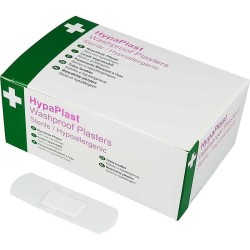First Aid Waterproof Plasters
There is 1 product.
Active filters
About First Aid Waterproof Plasters
Complete Water Protection for Extended Exposure
First aid waterproof plasters provide complete water protection suitable for extended water exposure including swimming, showering, and water-based activities across care facilities, sports environments, swimming pools, and outdoor contexts throughout England, Scotland, Wales, and Northern Ireland. These specialist plasters comprise fully waterproof materials maintaining complete wound protection during prolonged water exposure, offering reliable coverage enabling participation in aquatic activities. Organisations rely on waterproof plasters for swimming pool wound care, care facility bathing assistance, sports aquatic activities, outdoor water exposure, and complete wound protection during extended moisture contact. Modern waterproof plasters incorporate features including complete waterproof protection maintaining dry wound environment during extended water exposure, strong adhesion preventing lifting in water, transparent or flesh-coloured materials, varied sizes accommodating different wounds, and suitable construction for swimming and showering. The provision of waterproof plasters demonstrates commitment to inclusive activity participation, supports continued aquatic activities despite wounds, enables comprehensive wound care, and fulfils specialised protection requirements across contexts involving significant water exposure throughout professional environments.
The implementation of waterproof plasters directly supports continued activity participation, complete wound protection, and demonstration of comprehensive specialist wound care. Individuals with minor wounds seeking to swim, shower, or participate in water activities require complete waterproof protection maintaining wound hygiene and healing. Waterproof plasters address these needs by providing complete protection during extended water exposure, enabling swimming and aquatic sports participation, supporting care facility bathing with wound protection, maintaining clean dry wound environment despite water contact, and demonstrating inclusive professional care. Application scenarios include swimming pool wound care enabling continued participation, care facility resident bathing support, aquatic sports injury management, outdoor activity wound protection, and situations requiring complete water protection. Organisations benefit from waterproof plasters through inclusive activity provision, demonstrated professional capability, enhanced participant or resident satisfaction through continued activity participation, and comprehensive wound care. Modern waterproof plasters incorporate features such as improved sealing, transparent designs, and extended wear capability throughout England, Scotland, Wales, and Northern Ireland.
Selecting and implementing waterproof plasters requires assessment of water exposure scenarios, appropriate specification, and integration with activity and care protocols across organisations throughout the UK. Activity coordinators, care managers, and sports supervisors should evaluate water exposure duration and intensity, assess wound protection requirements for swimming and bathing, consider participant or resident needs, and calculate adequate stock levels. Product selection should prioritise complete waterproof protection tested for swimming and showering, varied sizes accommodating different wounds, strong adhesion maintaining seal in water, appropriate materials for extended water exposure, and adequate quantities ensuring availability. Implementation protocols should encompass integration with swimming pool, care bathing, or aquatic activity supplies, education on waterproof plaster application emphasising proper sealing, wound assessment procedures determining suitability for water exposure, and documented supply management. Quality assurance measures should include regular stock checks, usage monitoring, evaluation of waterproof performance, and wound care integration. Modern waterproof plaster management may incorporate activity planning and wound assessment protocols. Organisations should establish wound care procedures including appropriate waterproof plaster use for aquatic activities, integrate with activity planning and care protocols, and maintain documentation. Swimming pools and aquatic facilities require readily accessible waterproof plaster stocks. Staff education should address waterproof plaster characteristics and performance, correct application including ensuring complete adhesion and dry skin preparation, appropriate scenarios, wound assessment ensuring suitability for water exposure, and monitoring including checking plaster integrity during activities. Storage should protect plasters whilst ensuring accessibility at swimming pools and bathing areas. By implementing waterproof plasters alongside professional protocols, organisations throughout England, Scotland, Wales, and Northern Ireland demonstrate commitment to inclusive activity participation, comprehensive wound care supporting continued engagement, specialist protection capability, and professional management enabling individuals with minor wounds to participate safely in swimming, bathing, and water-based activities across all care, sports, and activity environments involving significant water exposure.

